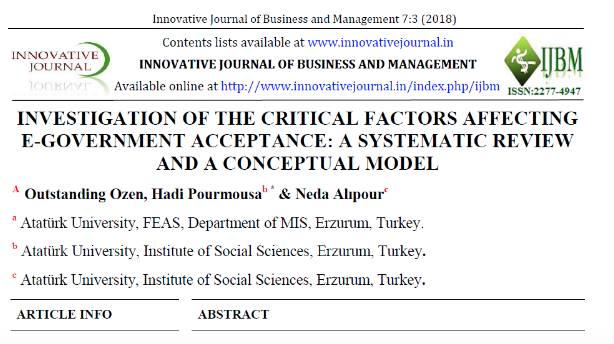
First it was there. Now it’s gone.
In March 2018, three researchers at Atatürk University in Turkey published“Investigation Of The Critical Factors Affecting E-Government Acceptance: A Systematic Review And A Conceptual Model” at the Innovative Journal of Business and Management, where it was freely available during 2018. It has no DOI, and no citations (that I know of).
Now it is gone; the link is redirected to the journal’s general search engine. A search for the title or authors there yields no hits; neither do the Google references to the article nor resources around it. The March 2018 issue has now an unexplained hole from pages 77–84. The Google Scholar index for this article disappeared in March 2019.
What happened?
After reading the article in December 2018, I contacted the authors about two issues. First, the article is a meta-analysis of 31 studies of the Technology Acceptance Model (TAM), a way to measure acceptance of software, which in the studies in question was used in the evaluation of e-government. One of the studies is Lin et al. 2011, which I have elsewhere showed is seriously flawed. My question to the authors was if, or how, they conducted a quality check of the 31 chosen articles, and if the inclusion/exclusion of such an article could potentially change the outcome of their own study, or reflect on its validity.
Second, the name of the first author of the now-disappeared paper was listed as “Outstanding Ozen.” Of note, the Turkish word üstün means superb or excellent, but is also a first name (much like the first name Magnus). My question to the authors was how (when and where in the process) this could have happened, and if this means that other parts of the article also could have been (machine) translated without the authors’ knowledge.
The authors did not respond to my questions, even after confirming that their email addresses were correct. But soon after, the article disappeared from the journal, without leaving any trace; no explanation, no notice. I contacted the journal about this in January 2019. Despite repeated efforts, I received no answer from them either. Retraction Watch has been writing since at least 2013 about why simply making an article disappear isn’t a good idea. Perhaps the authors or the editor hoped that the article will just be forgotten. That’s already worked on Google Scholar.
Daniel Jung is an assistant professor in the department of linguistic, literary and aesthetic studies at the University of Bergen in Norway.
Like Retraction Watch? You can make a tax-deductible contribution to support our growth, follow us on Twitter, like us on Facebook, add us to your RSS reader, sign up for an email every time there’s a new post (look for the “follow” button at the lower right part of your screen), or subscribe to our daily digest. If you find a retraction that’s not in our database, you can let us know here. For comments or feedback, email us at [email protected].
The journal website is riddled with typos, poor writing and broken English. Based on my review of the site, I’m not terribly surprised at their actions in this case.
As an example from the *first paragraph* on the homepage (http://innovativejournal.in/index.php/ijbm/index):
“Innovative Journal of Business and Mangement (sic) [IJBM] is a bimonthly, an (sic) international, refereed journal published with the aim to provide an online publishing platform for the academia, management researchers, and management students to publish their original works. IJBM focuses on publishing scholarly articles from the areas of management, management principles, recent inventions in management, company management, financial management, human resources, accounting, marketing, operations management, human resource management, statistics, international business, information technology, environment, risk management, globalization and related areas. Asian journal of management research (sic) seeks original manuscripts that identify, extend, unify, test or apply scientific and multi-disciplinary knowledge concerned to (sic) the management field.”
Interestingly the scope for IJBM is almost EXACTLY THE SAME as for the Asian Journal of Management Research (which appears incorrectly in the IJBM text)
http://www.ipublishing.co.in/ajmr.html
“Asian Journal of Management Research is a quarterly, international, refereed journal published with the aim to provide an online publishing platform for the academia, management researchers, and management students to publish their original works. AJMR focuses on publishing scholarly articles from the areas of management, management principles, recent inventions in management, company management, financial management, human resources, accounting, marketing, operations management, human resource management, statistics, international business, information technology, environment, risk management, globalization and related areas. Asian journal of management research seeks original manuscripts that identify, extend, unify, test or apply scientific and multi-disciplinary knowledge concerned to the management field.”
Both journals were previously removed from DOAJ because of “Suspected editorial misconduct by publisher”
https://doaj.org/faq#list
There are least three other journals with exactly the same “Aim and Scope”. I wonder if there is really a need for so many management research journals with exactly the same scope?
Vindhya International Journal of Management Research (ISSN 2395-2059)
http://vijmr.org/
Journal of Management Research and Analysis (ISSN 2394-2770)
http://jmraonline.com/
Journal of Advance Management Research (ISSN 2393-9664)
http://www.enrichedpub.com/journalpage.php?product_id=256&subopt=as
Love your work. Keep up the vigilance.
Hey, but in the EU the right to be forgotten is a fundamental human right. At least for the bad papers.
https://en.m.wikipedia.org/wiki/Right_to_be_forgotten#Current_legal_frameworks
This journal was listed in DOAJ, but was removed in the beginning of 2017 because of “Suspected editorial misconduct by publisher”, according to DOAJ’s spreadsheet of added and removed journals ()
Thank you. I could not find this at https://doaj.org/ – could you please provide the source? Thanks.
Source: https://docs.google.com/spreadsheets/d/183mRBRqs2jOyP0qZWXN8dUd02D4vL0Mov_kgYF8HORM/edit#gid=1650882189 second tab
Exactly. Unfortunately the link disappeared from my comment.